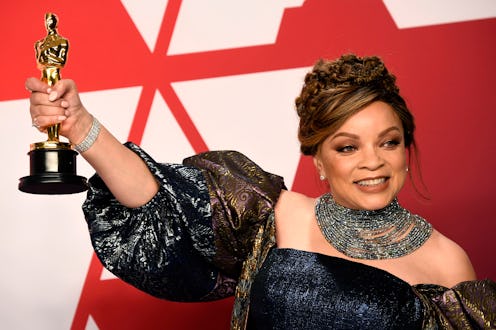Entertainment
More Women Than Ever Won At The Oscars, But Gender Equality Is Still A Long Way Off

This year's Oscars seemed to finally provide solid representation for women in a number of categories. While the shortlist for Best Director and Best Picture remained firmly male (what a surprise), women absolutely killed it throughout the rest of the ceremony, the Oscars 2019 set a new record for women, with a total of 15 female winners — "the most in Oscar history" according to Entertainment Tonight. But, as Women's Media Centre reports, it was actually only a quarter of the 211 individuals nominated who were female. Although that represents "25 per cent increase from the nominations two years ago," there's clearly still a very long way to go until women actually get the representation they deserve — especially in the major categories.
According to The Conversation, only 8 percent of the top 250 films in 2018 were directed by women — none of which were nominated for Best Picture. To make matters worse, in the Academy's 91-year history, only five female directors have been nominated for Best Director, with Kathryn Bigelow being the only winner (for Hurt Locker, which also won Best Picture, as the Guardian reported).
However, that's only the tip of the iceberg. If you delve a little deeper into the 89 films that have won Best Picture over the course of the Academy's history, "fewer than half" have passed the Bechdel Test, the BBC reports. The Bechdel Test is a measure of female representation used in film criticism. Basically, for a film to pass the test, at least two named female characters need to talk about something other than a man, the BBC explains.
Originating from a comic strip created by artist Alison Bechdel in 1985, the test was "never intended to be [used] as a serious method for measuring representation," the BBC writes, but has since become a baseline for analysing how women are portrayed in film, as well as how much speaking time women are given.
As evidenced by the research conducted by the BBC "100 Women" team (Amelia Butterly, Sarah Buckley, Georgina Pearce and Charlotte McDonald), the proportion of words spoken by female characters is shockingly low in the majority of films that have won Best Picture. In fact, there are two Best Picture films in which women do not speak more than 100 words. Surprisingly, this includes Bigelow's Hurt Locker (a movie that actually fails the Bechdel Test).
Even though the Bechdel Test has produced some pretty damning results, the test shouldn't be the only measure for female representation in film. As founder of Bechdel Test Fest Corrina Antrobus told the BBC, a new measure needs to be introduced that looks at intersectionality within film. "It would be a measure of how few films portray women of colour, the spectrum of sexualities, religious backgrounds and abilities so that we can get a better snapshot of who is missing or being poorly represented at the table," Antrobus said.
Clearly there's still a lot of work to be done in regards to female representation in film, but at least the Academy are finally moving in the right direction. Let's hope next year's ceremony sees (a lot) more female nominees for Best Director and Best Picture, and across the board.